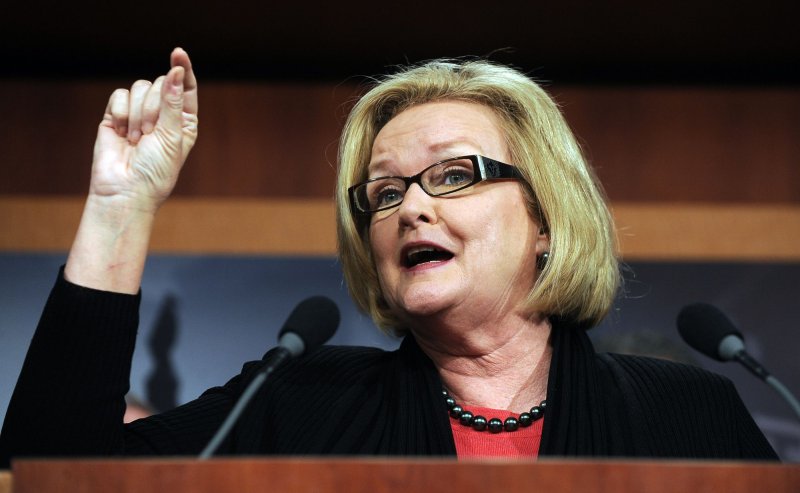1 of 3 | A series of pulbic relations gaffes could make Sen. Claire McCaskill, D-Mo., vulnerable in 2012. UPI/Roger L. Wollenberg |
License Photo
The 2012 general election may be about 20 months away but handicappers already are calling nine states critical to the U.S. Senate and presidential race.
Democratic incumbents are seeking re-election in states that were at or near the core of the presidential race in the past several elections -- and will be again next year, The Washington Post reported recently.
Some pundits say as the Senate goes, so goes the White House, so every race is key.
In Florida, Democratic Sen. Bill Nelson certainly will face his toughest challenge to retain the seat he first won in 2000. The White House -- sensing vulnerability and knowing the importance of the state in national elections -- has seen President Obama and Vice President Joe Biden visit the Sunshine state for fundraisers.
The same is true in Missouri, where incumbent Sen. Claire McCaskill, a strong Obama ally who has had a string of public relations problems recently, is seeking a second term. Ditto for Sen. Sherrod Brown, up for re-election in Ohio. In Michigan, the struggling economy could complicate Sen. Debbie Stabenow's re-election bid.
Then, there's Wisconsin, where Sen. Herb Kohl is pondering whether to run again.
Toss open seats in Arizona, Nevada, New Mexico and Virginia into the mix and the majority leadership in the Senate is up for grabs, the Post said.
But wait. What about the House?
Don't look now, but a survey indicates the U.S. House of Representatives could be up for grabs in 2012.
A new Democracy Corps survey in 50 of the most competitive battleground congressional districts indicates the just-elected Republican majority is at risk in 2012.
A key finding indicated GOP incumbents, identified by name, "have an average approval rating of 35 percent across the 50 districts, with 25 percent disapproving."
Not too good a finding.
Neither is this: Thirty-eight percent of respondents couldn't give candidates a rating, suggesting lack of visibility, Democracy Corps said on its Web site.
"This is about 10 points lower than the approval rating Democratic incumbents held in July of 2009" with a comparable disapproval rating, Democracy Corps said.
The survey also said 40 percent of voters in the 50 districts said they would vote to re-elect their incumbent while 45 percent said they "can't vote to re-elect" the incumbent.
The Democrats need to pick up the 25 seats to win back the majority.
Democratic committee names names of most vulnerable in House
A House Democratic campaign panel released its list of members it considered the most vulnerable in next year's election
On its list of the 15 U.S. representatives believed iffy in 2012, the Democratic Congressional Campaign Committee included Rep. Gabrielle Giffords, D-Ariz., undergoing rehabilitation after being shot in the head in Tucson. Six others were killed and 12 others injured.
Giffords won re-election by 2 percent of the vote last year, and DCCC officials may be acknowledging she could face another tough re-election, CNN reported.
All of the Democrats on the list squeaked by in last year's wins, noted the DCCC, which helps elect Democrats to the House and helps lawmakers keep their seats.
The incumbents on the DCCC list make up the group's Frontline program.
"In November, voters sent a clear message: focus on the economy and get Americans back to work," DCCC Chairman Steve Israel, D-N.Y., said in a statement. "Our members are hard at work doing just that -- representing their districts, standing up for the middle class and working to create jobs."
Florida Rep. Debbie Wasserman Schultz will lead the Frontline program, CNN said. Democrats who are members of the Frontline effort pledge to meet aggressive fundraising goals and step up person-to-person and online outreach work as well.
"The 15 Frontline Members are battle tested and survived tough re-elections to return to Congress," Israel added.
What a difference four years make for GOP
Former Minnesota Gov. Tim Pawlenty moved ever closer to announcing a run for the 2012 Republican nomination in a race where no one as yet has declared a candidacy outright.
What gives? About this time four years ago, the race for the presidency was going strong for both parties. This year, Washington watchers' eyes are on the Republicans who have neither announced nor dispelled talk of running for the party's nod, the Atlanta Journal-Constitution reported recently.
While they're talking like candidates, Republicans such as Mike Huckabee, Mitt Romney and Sarah Palin haven't committed to a candidacy.
Newt Gingrich, the Georgia Republican who led the House of Representatives in the mid-1990s, is the only other Republican who remotely announced his candidacy when he said he set up a Web site to determine public support for a possible run.
Lots of horses are crowding the GOP race so far, with Indiana Gov. Mitch Daniels, former Utah Gov. John Huntsman, Mississippi Gov. Haley Barbour, U.S. Reps. Ron Paul of Texas and Michele Bachmann of Minnesota, even first-term Sen. Rand Paul of Kentucky (and son of Ron) and others jostling to move ahead of the pack.















